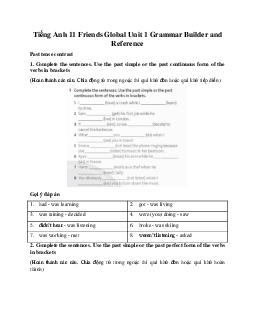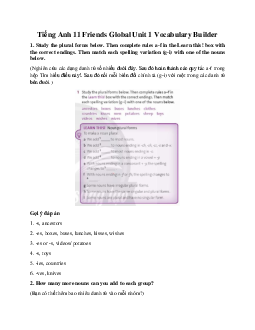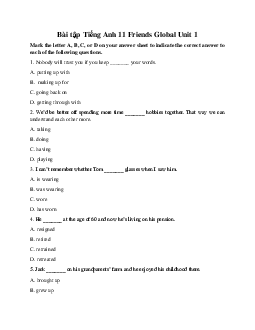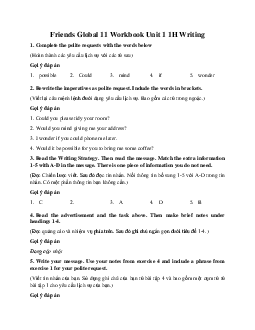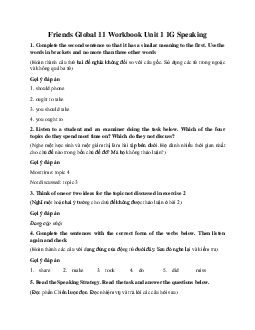






Preview text:
Tiếng Anh 11 Friends Global Unit 1 1A Vocabulary
1. Speaking: Work in pairs. Can you answer this famous riddle from Sophocles’s
play Oedipus the King? Explain your answer.
(Làm việc theo cặp. Bạn có thể trả lời câu đố nổi tiếng này từ vở kịch Oedipus the King
của Sophocles không? Giải thich câu trả lơi của bạn.)
‘What creature walks on four legs in the morning, two legs in the afternoon, and three in the evening?’
(Sinh vật nào đi bằng bốn chân vào buổi sáng, hai chân vào buổi chiều và ba chân vào buổi tối?) Gợi ý đáp án
The answer is a human. 4 legs in the morning is a baby crawling. 2 legs in the afternoon
is an older child or adult that walks using its legs. 3 legs in the evening is an elderly
person who uses a cane or walking stick to help them walk.
2. VOCABULARY Number the stages of life in order that people reach them. Then listen and check.
(Đánh số các giai đoạn của cuộc đời theo thứ tự mà mọi người đạt được chúng. Sau đó nghe và kiểm tra.) Gợi ý đáp án 1. be an infant 2. be a toddler 3. be a young child 4. be in your teens 5. be in your twenties 6. be an adult 7. be middle – aged 8. be elderly 9. be a centenarian
3. Match some of the phrases in exercise 2 with the pictures below of the woman at
different stages of her life.
(Nối một số cụm từ trong bài tập 2 với những bức tranh dưới đây về người phụ nữ ở các
giai đoạn khác nhau trong cuộc đời của cô ấy.) Gợi ý đáp án
In picture A, she’s an infant.
In picture B, she’s a young child.
In picture C, she’s in her teens.
In picture D, she’s in her twenties.
In picture E, she’s an adult.
In picture F, she’s middle-aged.
In picture G, she’s elderly.
In picture H, she's a centenarian.
4. VOCABULARY Check the meaning of the life events below. At what age are they
most likely to happen, do you think? Put them in groups A – E. Compare your
answers with your partner’s. Do you agree?
(Kiểm tra ý nghĩa của các sự kiện cuộc sống dưới đây. Theo bạn, chúng có nhiều khả
năng xảy ra nhất ở độ tuổi nào? Xếp chúng vào nhóm A – E. So sánh câu trả lời của bạn
với câu trả lời của bạn bạn. Bạn có đồng ý không?) Gợi ý đáp án
A. Before you are 20: be born, be brought up (by), grow up, go to university, start a school.
B. From 20 to 40: buy a house or a flat, fall in love, get married, get engaged, get your
first job, learn to drive, leave school, leave home, start a family, go to university.
C. From 40 to 60: get divorced, split up, have a change of career, start a business
D. Over 60: retire, pass away, settle down, become a grandparent.
E. At any age: move house, inherit (money, a house, etc.), emigrate.
5. Listen to four people talking about their backgrounds and their families. circle the correct answers (a-c)
(Hãy nghe bốn người nói về xuất thân và gia đình của họ. khoanh tròn các câu trả lời đúng (a-c).) Gợi ý đáp án 1. a 2. c 3. c 4. c Nội dung bài nghe
1. My name’s Bilal and I live in Bradford in the north of England. Both sets of my
grandparents emigrated from Pakistan in the 1960s, just before my parents were born. My
dad worked on the buses and my mum stayed at home and brought up the family. Dad
would like a change of career but it’s a bit late for him now to change jobs. I think he’s
just looking forward to retiring. I’ve got a sister who’s 25. She didn’t leave home until
last summer, when she got married. My dad wants me to go to university in Birmingham
and study law. But I think I’d like to start my own business, creating computer games.
2. Boy: Tell me a bit about your background, Sandra.
Girl: Well, I grew up in the village where my family has lived for generations. My great-
great-grandad moved here from Birmingham in the 1930s, looking for work
Boy: What kind of work did he find?
Girl: He found a job on a farm, just outside the village. He settled down, married a local
girl and started a family. They worked incredibly hard and over the years they managed
to save quite a bit of money and eventually bought a small farmhouse with some land.
Boy: And does your family still own that land?
Girl: Yes, it does. My great-great-grandparents had a son. When he got married, he
bought more land and now the farm is quite big. I don’t have any brothers or sisters so
one day I’ll inherit it and keep it running.
3. My mum met my dad while she was on holiday in France. She’s British and he’s
French. They fell in love, got engaged after a week and were married a month later. And then
I was born! They named me Charlotte as it’s both an English and a French name.
Anyway, unfortunately the marriage didn’t last. They split up when I was just a toddler
and got divorced a few months later. I was brought up by my mum after she moved back
to the UK. It was tough for her being a single parent. But she went to university, got a
degree and then became a teacher. She met my step-dad at university and they’ve been married for about 10 years.
4. My name’s Callum. My mum’s parents were from poor working-class families in
Glasgow. They left school at sixteen and didn’t go to university. But they started a
successful business and didn’t retire until they were in their seventies. My mum inherited
quite a bit of money when they passed away, but she didn’t want to work in the family
business and sold it. She moved south and settled down in Liverpool. She got married
and took an office job. But she soon wanted a change of career. I think she was fed up
with the cold, wet weather too, because she persuaded my dad to emigrate to Australia
when I was two. I’d love to visit Glasgow and Liverpool one day and see where my mum
and her parents lived before emigrating.
6. Complete the sentences with the past simple form of the verbs below. Then listen again and check.
(Hoàn thành các câu với dạng quá khứ đơn của các động từ dưới đây. Sau đó nghe lại và kiểm tra.) Gợi ý đáp án 1. emigrated 2. didn’t leave - got 3. grew up 4. bought 5. fell - got 6. was - moved 7. left - didn’t go 8. started - didn’t retire
7. Work in pairs. Ask and answer about your family and your ancestors. Give extra
information where you can.
(Làm việc theo cặp. Hỏi và trả lời về gia đình và tổ tiên của bạn. Cung cấp thêm thông tin nơi bạn có thể.) Gợi ý đáp án
A: How long has your family lived in this city?
B: My family has been in Ho Chi Minh City for about fifty years. My parents and I were
born here. Therefore, this is also my hometown.
A: Did any of them move from another part of Vietnam? From where? When?
B: I remembered my dad used to told me that in 1930, my grandfather move from Dalat
City to HCM City to work and start a family with my grandmother. Because he loved the
beauty here, he decided to settle down in Sai Gon forever.
A: Did any of your ancestors or members of your family emigrate to another country? Where to? When?
B: Well, my family doesn't have anyone that emigrates to another country and we don't
have any intention to do so because we love the peace and the pace of life in HCM City.
A: Are you related to anyone famous? If so, who?
B: Well, I’m not related to anyone famous.
